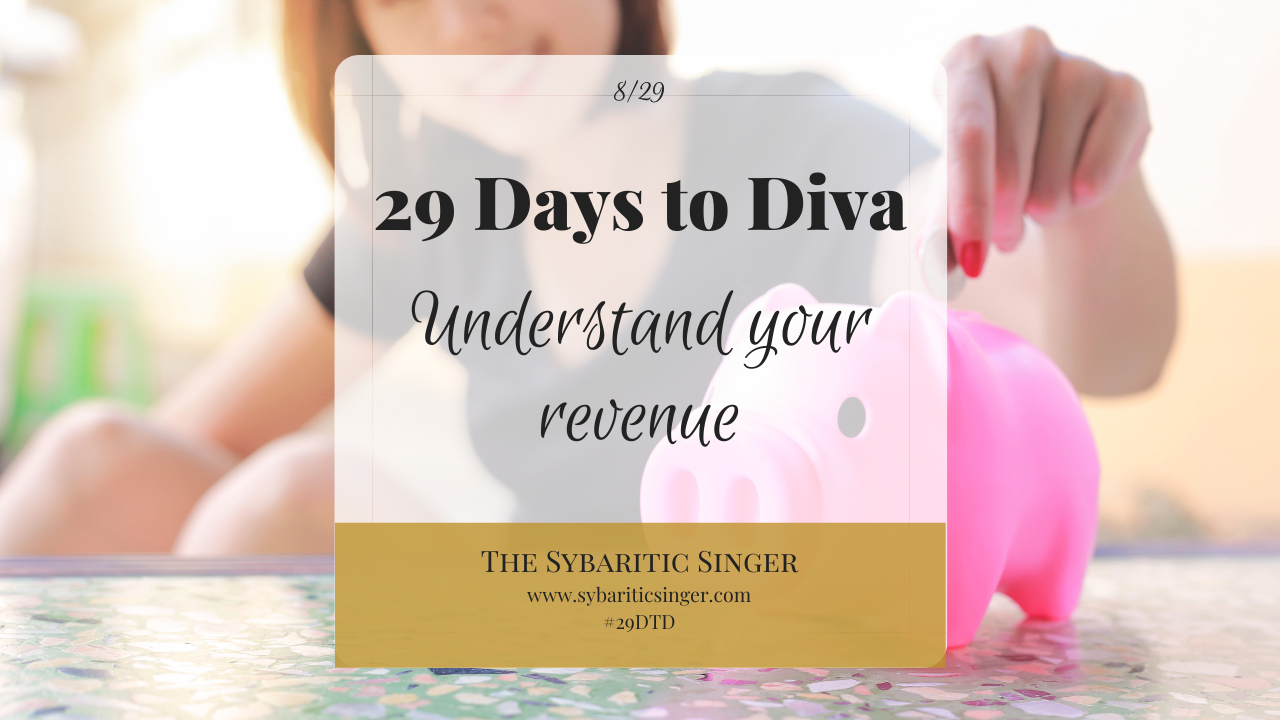If you’re here because you want to understand your music business better, I highly recommend we take a look at your revenue. Revenue is essential for almost every type of business. Companies, organizations, and individuals must generate revenue/resources to pay for the expenses they incur through the operation of their business. Revenue is the money you earn through your normal business operations. (You can also make revenue earned from interest or selling assets which is considered “non-operating revenue”, but we won’t be focusing on that a lot in today’s post.)

Your 29 Days to Diva – Day 8 Assignment: Understand your revenue
Revenue is the income you earn from any of your products or services. You’ve often heard me describe your products and services as your offers. If your revenues/income is declining year-after-year, we generally look at that as a sign that your business is dwindling or failing. I don’t think you need me to spell it out but… when your business generates more money, you have more resources to work with to pay down expenses and generate a profit. Your profit is the difference between the amount you earned and the amount you’ve spent.
When you’re starting a business, the goal is to quickly and effectively generate revenue. Plus, you want to keep the cost of running your business as low as possible. Honestly, this is why going into business as a classical musician/composer can look very daunting to our friends in the business world. There are still pretty massive start-up costs/indirect costs (lessons, instruments, higher education, festivals/YAPs, and more) that are unwritten-yet-de-facto-required by our field. Then, the fees paid to those in the emergent stages of their career are unsustainable on their own. This is not meant to dissuade you from pursuing your professionally creative goals, but to be honest about what the field looks like so that you can make the best choices for yourself.
I find looking at types of earned, passive, and portfolio income (earned income, profit, interest income, dividend income, rental income, capital gains, royalty income, and residual income) to be really helpful when I think about my own personal finances. When I think about my music business, I end up seeing revenue in much the same way that the non-profit world looks at it: earned and contributed.
Does your music business generate revenue in these areas?
- Earned
- Earned revenue happens when the person providing money will receive a good or service in exchange.
- You might experience this as ticket sales, payment for services/work or fees for service, lesson/workshop fees, album sales, book sales, royalties, mechanical licenses, synch licensing, and merchandise sales.
- Contributed
- Contributed revenue is when gifts are made freely without receiving any goods or services in exchange. Donations, grants, and non-cash donations are a few examples.
- Individual giving – this is all of the money you raise from individual donors.
- Grants – this is funding from a business, foundation, or a local government body for a specific purpose linked to public benefit. Unlike loans, grants are not to be paid back.
- Corporate sponsorship – this is usually a “marketing tactic” in which a for-profit entity provides support – usually financial – to a non-profit entity for an event or project.
- Contributed revenue is when gifts are made freely without receiving any goods or services in exchange. Donations, grants, and non-cash donations are a few examples.
A note about 501(c)(3) status
Some of the revenue streams under “contributed” might come with restrictions regarding 501(c)(3) status. You might run into a situation in which a grant stipulates that it is only available to 501(c)(3) organizations or fiscally-sponsored projects. I tend to advise my clients away from applying for 501(c)(3) status unless they already have a track record of revenue and want to provide programs and services under the oversight of a board for the long-term future. It has become more common to see funding organizations make individual/small group grant funding available to individuals acting as sole proprietors and fiscally-sponsored individuals/entities. You do not need to be a 501(c)(3) or a fiscally-sponsored entities to do crowdfunding or to accept gifts. However, you cannot offer a tax incentive to donors if you are not a 501(c)(3) or fiscally-sponsored. Finally, in a fiscal sponsorship arrangement, the sponsor accepts tax deductible donations and grants on behalf of the sponsored project/organization. That really means that they’ll keep the money in their accounts and pay it to you or to cover your expenses. They will likely take a fee since they’ll be responsible for merchant fees, the bookkeeping associated with the funds, and preparing tax forms if they are paying out your donations/grants to you as a contractor of the organization.
Prompts for understanding your music business revenue
- What types of revenue am I already generating in my professionally creative business?
- How am I tracking that revenue?
- How much revenue did I generate in each area last year?
- Are there any types of revenue that I would like to add to my business this year?
- How/when will I implement those?
- Do I have any professional associations with 501(c)(3) organizations that would offer me fiscal sponsorship if I needed it to be eligible for a grant/donation?
- What areas of revenue do I feel like I understand well? What areas of revenue do I have a lot of questions about?

Empower Your Farm with Bwer Pipes’ Irrigation Solutions: Bwer Pipes offers a comprehensive range of irrigation products designed to empower farmers in Iraq. From efficient sprinkler systems to durable pipes, our solutions are engineered to enhance water distribution, promote crop growth, and maximize yields, ensuring agricultural success. Visit Bwer Pipes